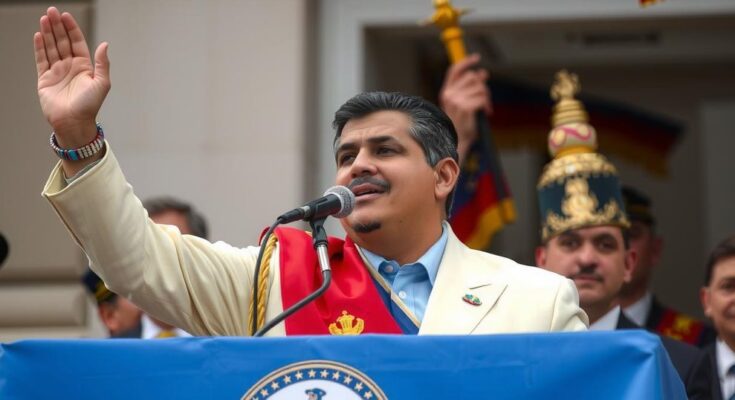Nicolás Maduro was inaugurated for a new term until 2031 despite allegations of electoral fraud, as credible evidence indicated opposition leader Edmundo González won the election. Protests erupted in Caracas, leading to detentions of opposition figures, including María Corina Machado, and a violent crackdown on dissenters. Global leaders condemned the regime’s actions, stressing the need for justice and accountability amid ongoing unrest.
On Friday, Venezuelan President Nicolás Maduro was sworn in for a new term until 2031 amidst allegations of electoral fraud and significant public unrest. The inauguration, held at the legislative palace in Caracas heavily guarded by security forces, followed contentious elections where credible evidence indicated that opposition leader Edmundo González was the legitimate victor. Despite these claims, Maduro’s government denied any wrongdoing, dismissed allegations as false, and reported their own victory shortly after voting concluded.
The political climate remains tense, as anti-Maduro protests erupted in Caracas, resulting in a crackdown on dissenters. Notably, María Corina Machado, a prominent opposition figure, was reportedly detained by security forces when she attempted to rally support against Maduro’s presidency. Leaders from both the Americas and Europe condemned the government’s repression and called for her release. U.S. President-elect Donald Trump voiced his support for Machado, emphasizing the necessity for safety among opposition leaders, stating, “These freedom fighters should not be harmed, and MUST stay SAFE and ALIVE!”
Accusations of electoral malpractice have plagued Maduro’s regime, particularly after the results of the July election were declared without substantive data to support the claims. The opposition released vote counts that suggested González received double the votes. International bodies, including the U.S.-based Carter Center, recognized these totals as legitimate, adding to the outcry demanding accountability and transparency.
Consequently, protests against the government have resulted in significant violence, with over 2,000 demonstrators arrested and reports of fatalities and torture among protesters in custody. Notably, the atmosphere surrounding the inauguration raised concerns, particularly with the absence of international observers and dignitaries, reflecting global discontent with Maduro’s leadership and accusations of autocracy.
As the political crisis intensifies, it remains uncertain whether González, currently in exile, will return to Venezuela, given the risks associated with government threats against him. The ongoing unrest and potential implications for democratic governance in Venezuela are under close scrutiny as the situation evolves.
The political situation in Venezuela is marked by instability and allegations of electoral fraud, particularly regarding Nicolás Maduro’s presidency. Following contentious elections, Maduro’s government has faced substantial accusations of suppressing dissent and manipulating election outcomes, leading to significant protests and unrest within the nation. The detainment of opposition figures, alongside global condemnation from various leaders, illustrates the increasing tension surrounding Maduro’s regime’s legitimacy. This context is crucial for understanding the dynamics of Madonna’s recent inauguration and the resulting public and international reactions.
In summary, Nicolás Maduro’s inauguration amidst credible allegations of electoral fraud and significant public outrage reflects a deepening crisis within Venezuelan politics. The reports of repression against opposition voices and the lack of international support highlight the challenging road ahead for Venezuela. With persistent protests and heightened tensions, the future of both the Maduro regime and the prospects for democratic governance remain uncertain, as calls for justice and accountability continue to resonate nationally and internationally.
Original Source: wsvn.com




